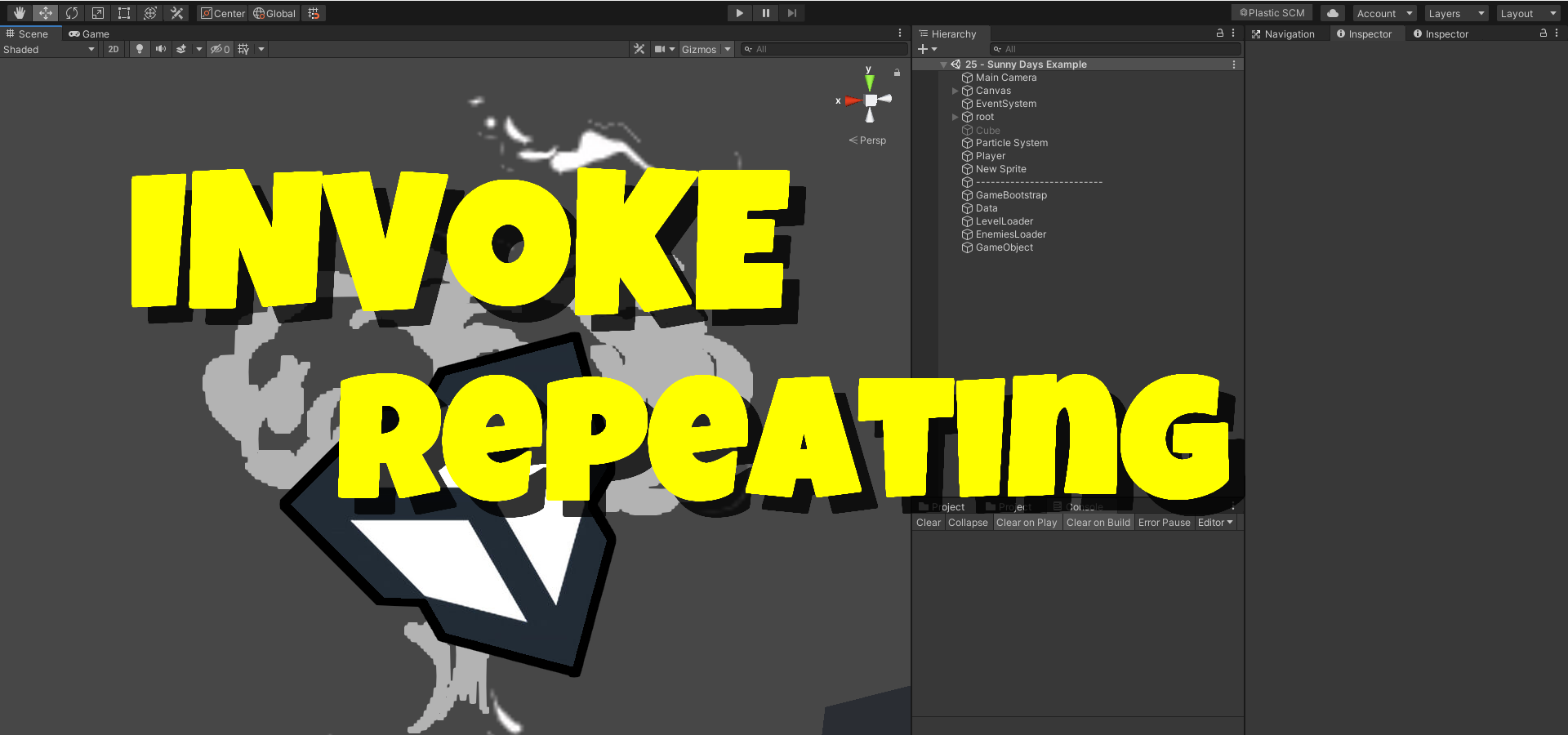Address
304 North Cardinal St.
Dorchester Center, MA 02124
Work Hours
Monday to Friday: 7AM - 7PM
Weekend: 10AM - 5PM
We use cookies to ensure that we provide you with the best possible experience on our site.

Your essential source on Unity and web development

Your essential source on Unity and web development
Unity InvokeRepeating is a powerful mechanism that allows you to call a specific method in your class at regular intervals, with or without a delay.
We will explore its usage in detail, its advantages and disadvantages, as well as its alternatives, like my other article on “Invoke”: Unity Invoke: A Deep Dive into Method Invocation in Unity
InvokeRepeating is easy to use. You specify the name of the function to call, the delay before its first call in seconds, and the interval between successive calls. If the delay is set to 0, the function is executed at the end of the current frame. Note that even if you deactivate the object after invoking InvokeRepeating, the function will continue to be called until the object is destroyed.
using UnityEngine;
public class InvokeRepeatingMonoBehaviour : MonoBehaviour
{
private void Start()
{
// Call the LaunchMissile function in 3 seconds, then every 0.3 seconds
InvokeRepeating("LaunchMissile", 3f, 0.3f);
}
private void LaunchMissile()
{
// Actions
}
}
One drawback of InvokeRepeating is that it requires the function name as a string, which can be problematic when refactoring your code. A better approach is to use “nameof” from C# 6, which ensures that function renaming is handled automatically.
using UnityEngine;
public class InvokeRepeatingMonoBehaviour : MonoBehaviour
{
private void Start()
{
// Call the LaunchMissile function in 3 seconds, then every 0.3 seconds
InvokeRepeating(nameof(LaunchMissile), 3f, 0.3f);
}
private void LaunchMissile()
{
// Actions
}
}
To cancel an Invoke, you can use the “CancelInvoke” method. You have the option to cancel all Invokes or a specific Invoke using the function name or “nameof”.
private void Cancel()
{
// Cancel all Invokes on the MonoBehaviour
CancelInvoke();
// Cancel only the LaunchMissile Invoke
CancelInvoke(nameof(LaunchMissile));
}
Unfortunately, InvokeRepeating does not allow passing arguments to the called function. For this feature, you will need to use coroutines. Coroutines offer more flexibility and allow you to manage parameters.
using System.Collections;
using UnityEngine;
public class InvokeRepeatingCoroutine : MonoBehaviour
{
private void Start()
{
StartCoroutine(LaunchMissile(3f, 0.3f, 5));
}
private IEnumerator LaunchMissile(float delay, float interval, int number)
{
yield return new WaitForSeconds(delay);
while (true)
{
// Perform your actions
yield return new WaitForSeconds(interval);
}
}
}
To stop a coroutine, it is recommended to use “StopCoroutine” by using the coroutine reference instead of the function name or “nameof”. This ensures better control over stopping coroutines.
You can also replace the while’s true with a condition.
using System.collections;
using UnityEngine;
public class InvokeRepeatingCoroutine : MonoBehaviour
{
private Coroutine _coroutineLaunchMissile;
private void Start()
{
// Store the reference in a property
_coroutineLaunchMissile = StartCoroutine(LaunchMissile(3f, 0.3f, 5));
}
private IEnumerator LaunchMissile(float delay, float interval, int number)
{
yield return new WaitForSeconds(delay);
while (true)
{
// Perform your actions
yield return new WaitForSeconds(interval);
}
}
private void StopCoroutineMissile()
{
// Stop all coroutines of the MonoBehaviour
StopAllCoroutines();
// Stop only one coroutine
StopCoroutine(_coroutineLaunchMissile);
}
}
When comparing InvokeRepeating with coroutines, it’s important to note that coroutines stop when the object is deactivated or destroyed, unlike InvokeRepeating, which continues to function as long as the object exists.
Coroutines can be chained and offer a variety of yield statements to address various use cases:
WaitUntil: Pauses execution until a specified function or delegate returns true.WaitWhile: The opposite of WaitUntil.WaitForSeconds: Delays for a set number of seconds.WaitForSecondsRealtime: Delays using unscaled time.WaitForEndOfFrame: Delays until just before the frame finishes rendering.WaitForFixedUpdate: Useful for physics-related work.For a comprehensive understanding of coroutines, please refer to Unity’s full documentation.
In conclusion, while InvokeRepeating is a functional method for invoking functions in Unity, coroutines offer better control, and a more robust approach for handling complex scenarios. Consider adopting coroutines for your Unity projects to enhance efficiency.
Have you just started your Unity adventure?
Check this article to start in the best possible way: The Best Advice I Wish I Had When I Started Game Development
Check our other articles about Unity:
